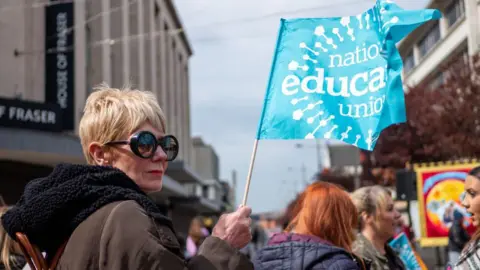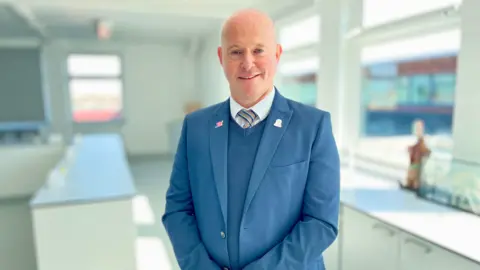Teachers in England say they would strike over pay
 Getty Images
Getty ImagesTeachers in England have said they would be willing to strike over the government's proposed 2.8% pay rise this year.
The offer was rejected by 93.7% of members of the National Education Union (NEU), England's largest teaching union, who took part in an informal ballot.
And 83.4% indicated they would be willing to strike in the vote, which aimed to gauge teachers' mood.
Education Secretary Bridget Phillipson said "any move towards industrial action by teaching unions would be indefensible".
The vote does not mean teachers are about to strike.
They have to support industrial action in a formal ballot before that can happen, and enough of them have to vote.
A vote on the next steps will take place at the annual conference of the NEU in Harrogate next week.
Any formal ballot would be likely to take place in summer.
The government recommended a 2.8% pay rise for millions of public sector workers, including teachers, at the end of last year.
The NEU wants the government to fund the pay rise so that schools do not have to pay for it through existing budgets. At present, the government expects most schools will have to make "efficiencies" to afford the additional cost.
The NEU also says the pay rise needs to be higher to address a "crisis" in recruiting new teachers and keeping them in the profession.
Rachael Fidler, a school and college trust leader at Dixons Academies Trust, told the BBC that offering some flexible working made "life a little easier" for staff, but pay was an important part of attracting graduates.
"What other job can you say you make a massive difference to the world that you live in?" she asked.
"But we have to be realistic. We have to attract a new generation who can be offered flexible working in other sectors, who can be offered well-paid positions."
Rob Owens, a science teacher at Dixons Croxteth Academy, said the remit of his job had widened since he entered the profession 20 years ago.
 BBC/John Boon
BBC/John Boon"There's increasing demands on teachers now, more than there ever has been," he said.
"That is beyond planning and marking. There's now increasing demand on schools to support the most vulnerable students and families."
The results of the NEU's indicative ballot, which ran from 1 March until Friday, showed:
- 93.7% of members rejected the offer
- 83.4% of members would be willing to strike "to secure a fully funded, significantly higher pay award".
A total of 134,487 teachers voted, representing less than half (47.2%) of eligible members.
NEU general secretary Daniel Kebede said the government "must listen to our profession and change course on teacher pay".
"It must recognise the dire state of school funding and invest in education, to give the next generation the best chance possible in life," he said.
Ms Phillipson said: "With school staff, parents and young people working so hard to turn the tide on school attendance, any move towards industrial action by teaching unions would be indefensible.
"Following a 5.5% pay award in a hugely challenging fiscal context, I would urge NEU to put children first."
NEU members went on strike over pay in the first half of 2023, forcing many schools to close on eight days of action.
It caused disruption for parents who had to take days off work or juggle childcare with working from home.
The NEU called off action after the government revised its 2023 offer to 6.5%.
Teachers were then given a 5.5% rise in 2024.
Ms Phillipson said last summer that she wanted to "reset" her department's relationship with the education workforce.
And the Department for Education says school funding is increasing by £3.2bn in the 2025-26 financial year.
But the teaching unions expressed concern when the government offered a 2.8% pay rise in December.
In a letter to Ms Phillipson, Mr Kebede and the leaders of three other unions said they had been clear that the 5.5% rise "must be only the first in a series of fully funded, above-inflation pay increases".
Jack Worth, an education economist at the National Foundation for Educational Research, told the BBC the 2.8% offer seemed "too much for schools" to cover from their budgets, but also "too little" to make teacher pay competitive in the wider labour market.
Additional reporting by Branwen Jeffreys and Hope Rhodes.
